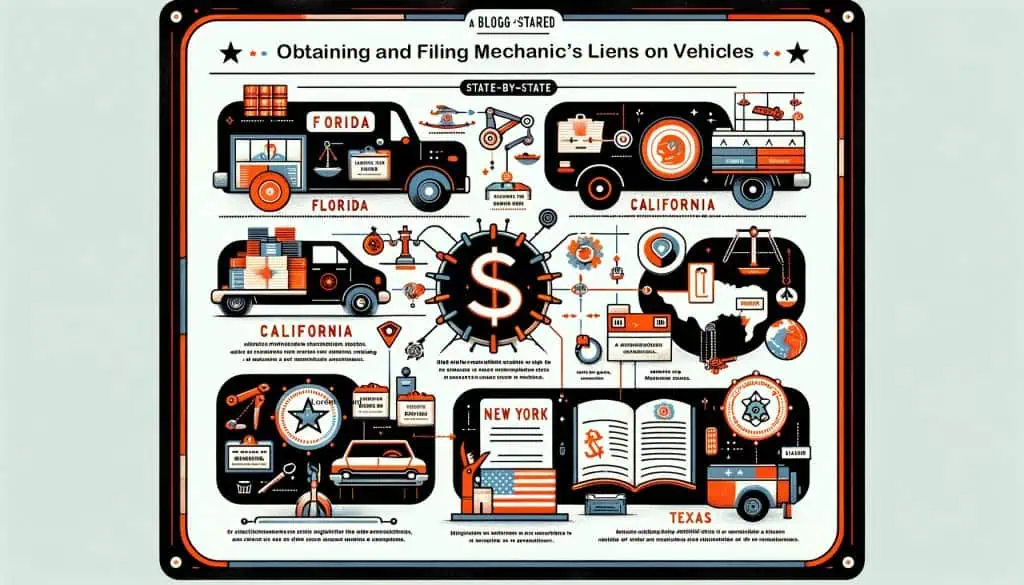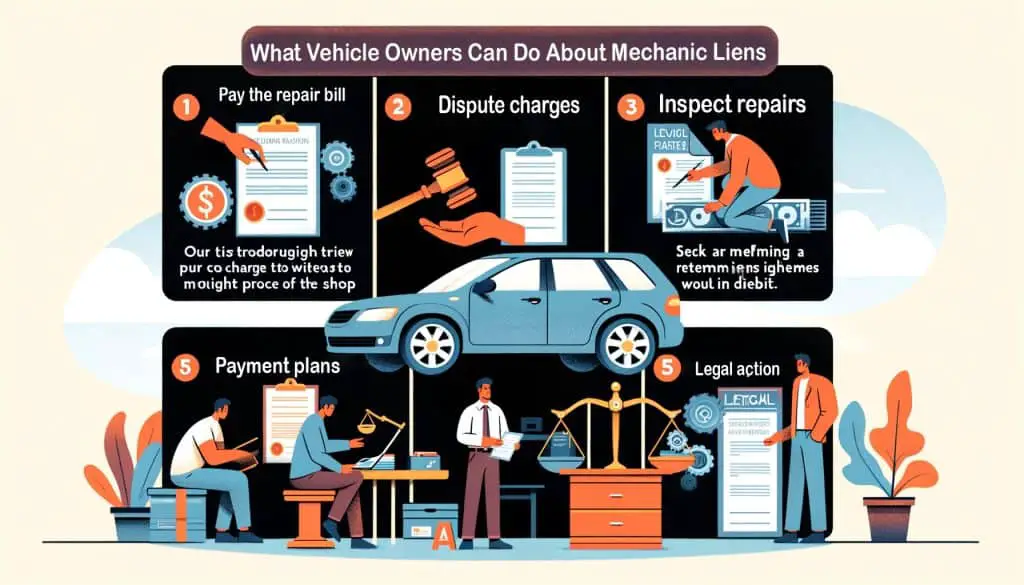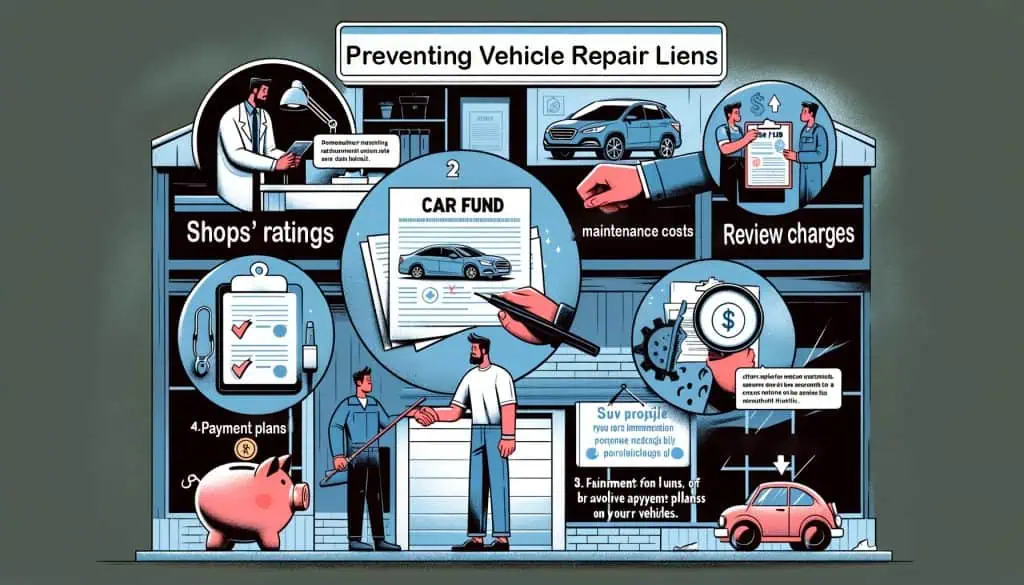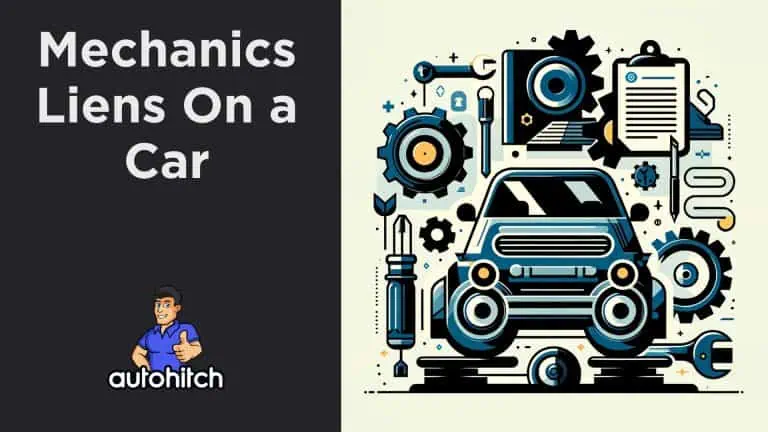As a former licensed car dealer, I’ve seen my fair share of disputes between repair shops and car owners over unpaid service bills.
When customers fail to pay for work done on their vehicle, the repair facility may take legal action by placing a “mechanic’s lien” on the car’s title.
This gives them leverage to potentially sell the vehicle at auction and recover their costs.
Below I will discuss how to file a mechanics lien on a car plus some details on how to enforce them.
Related Article You Might Be Interested In:
Table of Contents
What is a Mechanic’s Lien?
A mechanic’s lien, also called a “garageman’s lien” or “artisan’s lien”, allows vehicle any vehicle service provider to keep possession of a car if a customer fails to pay for any repairs, parts, storage, or towing they authorized.
Some important aspects of mechanics liens:
- They are statutory liens that service providers obtain by following state laws.
- They have priority above lender liens from a financed vehicle loan.
- Repair shops holding liens may potentially sell the vehicle after providing required notices.
- Sale proceeds first pay repair bills; any remainder goes to the registered owner.
How to File a Mechanics Lien on a Car
Here is a helpful article on how to file a mechanic’s lien on a car in the United States:
How to File a Mechanic’s Lien on a Car
If you are an auto mechanic or own an auto repair shop and a customer has not paid their bill, you may be able to place a mechanic’s lien on their vehicle. A mechanic’s lien is a legal claim that allows you to keep possession of the car until you have been paid for the parts and labor. In some cases, it even allows you to sell the vehicle to recoup the money owed.
The specific requirements and process for filing a mechanic’s lien vary by state. However, the general steps are:
- Ensure the debt is valid and past due, usually for 30-90 days depending on the state
- Notify the vehicle owner of your intent to file a lien, giving them a chance to pay
- File the appropriate lien paperwork with your state’s DMV or county recorder’s office
- If the lien is granted, maintain possession of the vehicle in a secure location
- Notify the owner that you have a lien and intend to sell the vehicle if not paid by a certain date
- If still unpaid, sell the vehicle at auction following your state’s lien sale procedures
Some key things to keep in mind:
- Mechanic’s liens take priority over any loans on the vehicle, even if those loans existed first[1][2]
- You must carefully follow your state’s notification and filing procedures or the lien may be invalid[3]
- You can usually charge reasonable fees for towing and storage in addition to parts/labor[2]
- If you improperly refuse to return a vehicle, the owner may be able to sue you for conversion[2]
How to Get a Mechanics Lien in Your State

While the core concept is the same, the details of the lien process vary significantly by state. Here are a few examples:
Florida
- Must file lien within 90 days of work completion
- Lien expires after 1 year unless a lawsuit is filed
- Owner must be notified by certified mail within 15 business days of filing
Texas
- Lien must be filed within 180 days of when payment was due
- Owner must be notified within 10 days of filing
- Lien expires after 1 year
California
- Lien must be filed within 30-90 days depending on vehicle value
- DMV notifies owner for vehicles over $4000; shop notifies if under $4000
- Owner can request to inspect vehicle and get copy of invoice within 10 days
New York
- Lien must be filed within 30 days of when storage began
- Lien expires after 1 year
- Owner must be notified at last known address within 5 days
Why Repair Shops Pursue Mechanic’s Liens
For auto service providers, mechanic’s liens offer assurance they’ll get paid for labor and parts rendered after:
- Customers lack sufficient funds to pay repair bills
- Bad checks or stopped payments for vehicle services
- Disputes over the quality or necessity of repairs
Rather than absorbing losses from unpaid service bills, repair shops rely on lien rights to take possession of an improved vehicle and eventually sell it to recover their invested time and materials.
What Vehicle Owners Can Do About Mechanic Liens

If you receive notice that a mechanic’s lien has been placed on your car, act promptly within state guideline time periods. Potential options:
- Pay the repair bill – The simplest path to resolve the situation if you have the funds.
- Inspect repairs – You may be entitled to check the service quality before paying.
- Dispute charges – Seek legal advice about filing a court claim against invalid lien amounts.
- Payment plans – Ask the shop about arranging installments to release the lien.
- Legal action – Consult an attorney regarding remedies like demanding proof of debt.
Essentially, it boils down to either paying what you owe, resolving the unpaid debt, or trying to prove the lien invalid on legal grounds, which might end up costing you more than simply paying the bill.
Avoid ignoring the notices, as that risks the shop proceeding with selling your vehicle.
Important tip:
Although a mechanic could sell your vehicle (If it is in their possession), that isn’t a simple or easy process. They must follow strict legal guidelines related to process and proper notification of ANY parties involved. If they skip any required steps, the sale would be illegal!
Preventing Vehicle Repair Liens

While it is tricky to eliminate the possibility of mechanic liens entirely if you lack funds, a few proactive steps can help avoid or prepare for them:
- Research repair shops’ ratings and complaint records before choosing where to get work done. Avoid disreputable facilities.
- Save for expected vehicle maintenance costs with a dedicated savings account or “car fund”.
- Review charges closely and resolve discrepancies promptly before repairs are completed.
- Ask for payment plans upfront if you foresee difficulty with a large bill.
Being an informed and proactive consumer reduces the likelihood of payment disputes down the road. Auto shop reputation and upfront cost discussions matter.
The Bottom Line on Car Mechanic Liens
Mechanic’s liens offer critical protections for vehicle service providers when customers fail to pay bills. However, strict rules also aim to protect car owners against repair shop abuse.
Know your rights and lien enforcement procedures in your state if you face notices. With prompt action, owners can sometimes resolve unpaid debts without the shop proceeding to auction.
And better still – taking preventative steps helps avoid mechanic’s liens altogether through open communication and financial planning.



